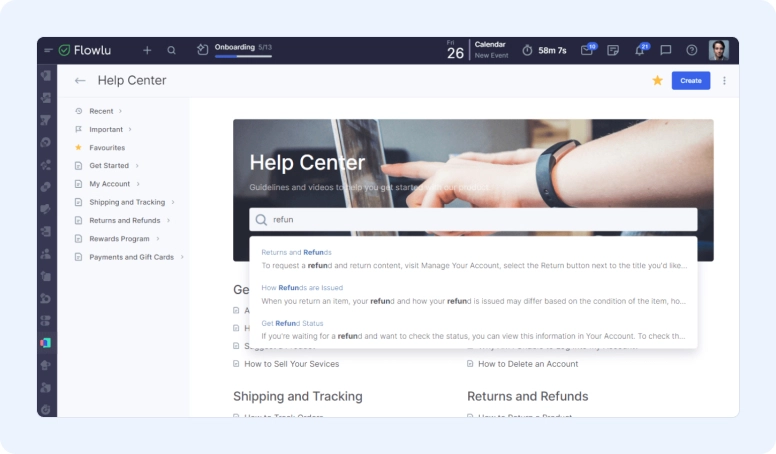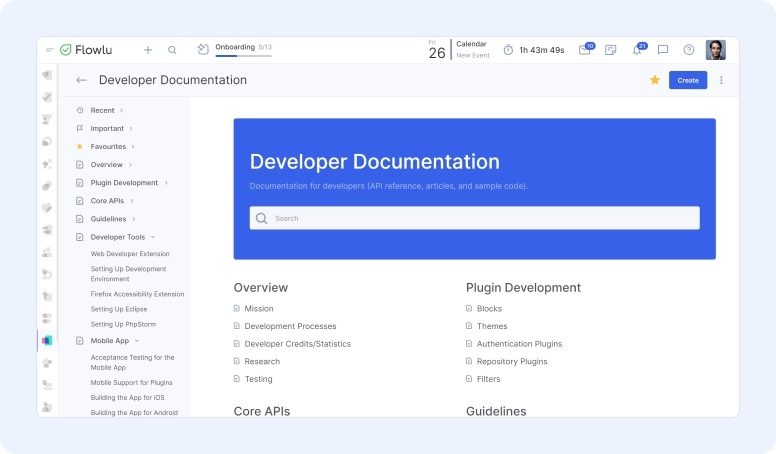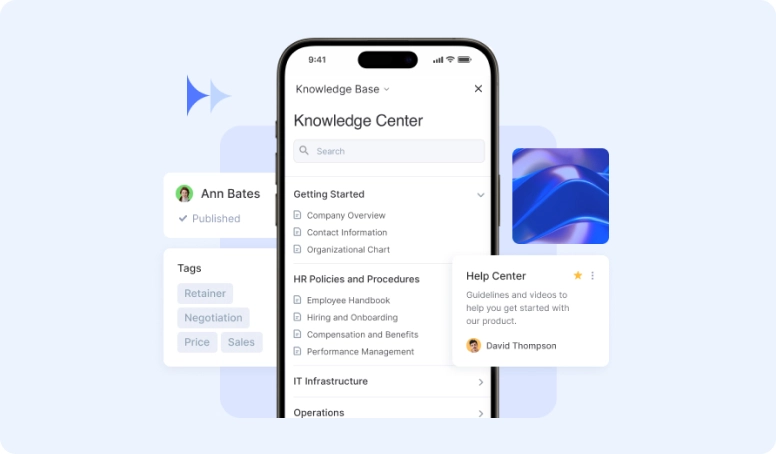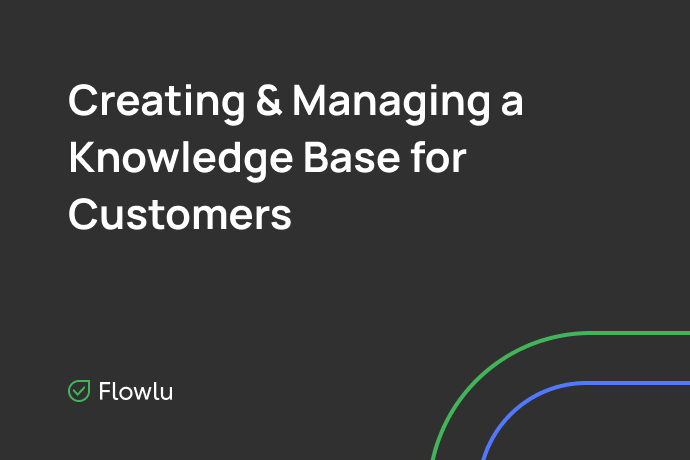Unlock Hidden Expertise: Online Knowledge Management for a Smarter Workplace
Even while 87% of firms understand the importance of knowledge retention, only 42% have formal plans in place. Let's look at how you can utilize this power.
Understanding Online Knowledge Management
Consider knowledge management to be your organization's equivalent of a large library. It captures, saves, and distributes knowledge, allowing everyone to easily find what they need. A good online KMS should function similarly to a digital librarian, always ready to assist you in finding the information you require.
Some of its essential components are listed below:
-
Capturing and collecting data from various sources, such as documents, employee files, and databases.
-
Storing and structuring knowledge in digital repositories that are easily accessible.
-
Easy sharing is critical for distributing knowledge throughout your organization.
-
Simplifying knowledge retrieval—Users (or employees) must be able to easily access and locate information. Otherwise, maintaining a KMS would be pointless. By the way, Flowlu includes powerful search tools that enable users to quickly locate relevant information.
-
Using collected information to make better, data-driven decisions
The Importance of Knowledge Management
So, why bother with knowledge management? It improves:
-
Efficiency: Employees spend less time looking for information and more time using it. A well-organized KMS reduces duplicate efforts and accelerates workflows.
-
Collaboration: When everyone gets access to the same pool of knowledge, cooperation improves, resulting in more invention and fewer hiccups.
-
Retention of Expertise: People come and go, but wisdom endures. A KMS maintains key insights within the organization.
-
Continuous Learning: A KMS promotes constant learning, allowing employees to improve and share their newly acquired expertise. Investing in staff education, such as funding MBA costs, can help improve the KMS's overall effectiveness by increasing workforce knowledge and skills. When considering the potential benefits of investing in employee education, it's important to focus on areas where it can significantly impact the organization. For example, funding online MBA costs can help employees develop the strategic thinking and leadership skills needed to drive innovation and improve decision-making. By understanding the specific benefits that employee education can offer, organizations can identify the most promising areas for investment and allocate resources accordingly. This can lead to a more skilled and engaged workforce, ultimately driving business success.
Setting Up an Effective Knowledge Management System
Implementing a successful KMS involves a few key steps:
-
Identify Knowledge Needs: What do you need to know? Identify critical information such as procedure manuals, best practices, and project specifications.
-
Choose the Right Platform: Look for a KMS that is as easy to use as your favorite app. Flowlu, for instance, offers ease of use, scalability, and user-friendly editor.
-
Customize Your Knowledge Base: Flowlu allows organizations to tailor the knowledge base to their specific needs, including custom fields and tags.
-
Encourage Participation: A KMS is only as effective as its contributors. Encourage everyone from your team to contribute by making it enjoyable and rewarding.
-
Maintain and Update Content: Keep information current and relevant. Regular updates are essential for preventing a dusty, obsolete knowledge base. Use Flowlu’s automation rules for a knowledge base to eliminate routine tasks, reducing manual effort and increasing efficiency.
Overcoming Challenges in Knowledge Management
Implementing a KMS can be difficult, but it is worth it. Here's how to address typical challenges:
-
Cultural Resistance: Change can be frightening. Make it rewarding for employees to share their knowledge.
-
Keeping Information Updated: Think of it as a garden. Regular care is essential to maintain it colorful and functional.
-
Data Security: Safeguard your precious trove. Ensure that your KMS has strong security mechanisms in place to protect sensitive information.
Best Practices for Knowledge Management
Maximize your KMS with these best practices:
-
Create a Knowledge-Sharing Culture: Integrate knowledge sharing into your company's DNA. Lead by example and recognize contributions.
-
Leverage Technology: To efficiently organize and retrieve information, use modern techniques such as AI and machine learning.
-
Train Employees: Ensure that everyone understands how to use the KMS and its usefulness.
-
Measure Impact: Impact should be measured on a regular basis to see how the KMS promotes teamwork and productivity. Use feedback to drive ongoing improvement.
The Future of Knowledge Management
The future is bright for KMS, thanks to emerging trends:
AI and Machine Learning: These technologies can automate organizing and retrieval, making it easier to locate information.
By 2025, it is predicted that 80% of firms would have used AI in their knowledge management solutions. AI is valued for its capacity to save time. It cuts the time employees spend looking for information by up to 40%.
How?
For one, AI and machine learning algorithms automatically tag and categorize information based on its context and relevance. Furthermore, this ensures that the metadata for the document is consistent across all files.
Next, consider the power of AI-powered search engines. Such systems use natural language processing (NLP) to accurately interpret the user's requests, resulting in more accurate responses.
Machine learning also enhances tailored recommendations. It does this by studying user behavior and preferences. You may also see how many of the tools you use today already include an "AI" capability. They primarily aid with content creation and summarization. For example, it can summarize content from lengthy texts or generate automated responses based on current data.
Mobile Access: With remote work on the rise, having mobile-friendly access to your KMS is essential.
Modern KMS platforms like Flowlu respond to this trend by making their interface responsive, adapting to various screen sizes whether on a computer, smartphone, or tablet.
Some industries that place a high priority on this include field service operations and healthcare. In the former, field service professionals want quick access to information, troubleshooting guides, and manuals both on and off site. Meanwhile, medical practitioners must be able to swiftly access their patient information, research studies, and treatment regimens from anywhere and at any time.
The primary problem here is connection. What if you are somewhere without an internet connection? The deployment of 5G technology has already improved the performance of mobile KM applications.
Integration with Other Tools: Integration with project management and communication technologies improves productivity. Flowlu ensures that information is centralized and accessible from a single platform, eliminating errors and duplication.
Conclusion
Knowledge is powerful, but only when it is accessible. Online knowledge management systems, like Flowlu, reveal hidden expertise and revolutionize companies. Organizations may improve productivity, cooperation, and continuous learning by centralizing and organizing information, creating a knowledge-sharing culture, and using advanced technologies. Implement an online KMS that fulfills your requirements and motivates your team to embrace the change. Observe how your workplace grows smarter and more efficient. Unlock the potential of your organization with Flowlu today!
Flowlu's online knowledge management system (KMS) offers numerous benefits, including:
- Centralized Information Repository: All organizational knowledge is stored in one easily accessible location.
- Improved Efficiency: Reduces the time employees spend searching for information, allowing them to focus on their core tasks.
- Enhanced Collaboration: Facilitates knowledge sharing across departments and teams, fostering collaboration and innovation.
- Retention of Expertise: Preserves crucial knowledge and expertise even when employees leave the organization.
- Continuous Learning: Promotes a culture of continuous learning by providing employees with easy access to training materials and resources.
Flowlu ensures that its knowledge management system is fully accessible on mobile devices, offering several key features:
- Responsive Interface: The platform's interface adapts to various screen sizes, whether users are on a computer or smartphone.
- Seamless Synchronization: Ensures that any changes made offline are automatically synchronized once the device is back online, maintaining up-to-date information across all devices.
Flowlu offers a high level of customization to tailor the knowledge base to specific organizational requirements:
- Custom Fields and Tags: Organizations can create custom fields and tags to organize information in a way that aligns with their unique processes and needs.
- User Permissions: Administrators can set different access levels and permissions for various users, ensuring that sensitive information is only available to authorized personnel.













